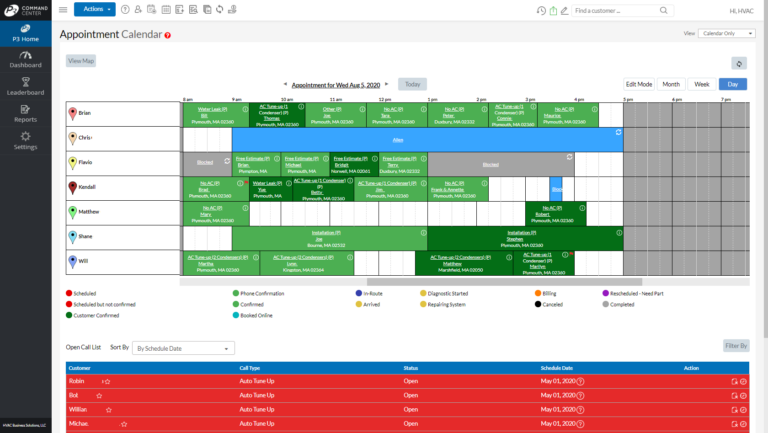In the realm of HVAC systems, dispatch programs emerge as unsung heroes, silently orchestrating the efficient operation of your heating, ventilation, and air conditioning systems. These programs are the unsung heroes, ensuring optimal comfort, energy savings, and equipment longevity. Dive into this comprehensive guide as we unravel the intricacies of dispatch programs for HVAC, exploring their types, features, and the benefits they bring to your HVAC operations.
Dispatch programs serve as the central nervous system of your HVAC system, coordinating and optimizing the performance of individual units to achieve maximum efficiency. They provide real-time monitoring, automated scheduling, and fault detection capabilities, empowering you with unprecedented control over your HVAC operations.
Overview of Dispatch Programs for HVAC Systems

Dispatch programs play a vital role in optimizing the performance and efficiency of HVAC systems. These programs provide a centralized platform for managing and dispatching service technicians, ensuring prompt and efficient response to service requests.
Types of Dispatch Programs
There are several types of dispatch programs available, each with its unique features and capabilities:
- Cloud-based Dispatch Programs:These programs are hosted on the internet, allowing for remote access and real-time updates. They offer flexibility and scalability, making them suitable for businesses of all sizes.
- On-premise Dispatch Programs:These programs are installed on a local server, providing more control over data and security. They are often preferred by larger organizations with complex HVAC systems.
- Mobile Dispatch Programs:These programs are designed for use on mobile devices, allowing technicians to access work orders, update statuses, and communicate with dispatchers in real-time. They enhance efficiency and reduce response times.
Popular Dispatch Programs
Some popular dispatch programs used in the HVAC industry include:
- ServiceTitan
- FieldEdge
- SmartService
- Housecall Pro
- HVAC Cloud
These programs offer a range of features such as work order management, technician scheduling, GPS tracking, and customer communication, helping HVAC businesses streamline their operations and improve customer satisfaction.
Implementation and Best Practices for Dispatch Programs
Dispatch programs are an essential tool for optimizing the performance of HVAC systems. To ensure their successful implementation, it is crucial to follow established guidelines and adopt best practices.
Effective dispatch programs require a well-defined strategy that aligns with the specific needs and objectives of the HVAC system. This involves identifying the key performance indicators (KPIs) to be tracked, establishing clear dispatch rules, and setting appropriate thresholds for triggering dispatch actions.
System Integration
Seamless integration of dispatch programs with the HVAC system is paramount. This includes establishing a reliable communication channel between the dispatch software and the HVAC equipment. Real-time data exchange enables the dispatch program to monitor system performance and make informed decisions.
Performance Monitoring
Regular monitoring of dispatch program performance is essential to ensure optimal operation. This involves tracking key metrics such as response time, dispatch accuracy, and system efficiency. Performance data should be analyzed regularly to identify areas for improvement and make necessary adjustments.
Staff Training
Proper training of staff responsible for operating the dispatch program is crucial. They should be well-versed in the program’s functionality, dispatch rules, and troubleshooting procedures. Training should be conducted regularly to ensure continued proficiency.
Common Challenges
Despite careful planning, dispatch program implementation may encounter challenges. These include:
- Data quality issues: Ensuring the accuracy and reliability of data used by the dispatch program is essential.
- Equipment compatibility: Compatibility issues between the dispatch program and HVAC equipment can lead to operational problems.
- Resource constraints: Limited resources, such as staff or budget, can impact the effectiveness of dispatch programs.
Solutions
To address these challenges, consider the following solutions:
- Data validation: Implement robust data validation procedures to ensure the quality and reliability of data used by the dispatch program.
- Thorough testing: Conduct thorough testing before deploying the dispatch program to identify and resolve any compatibility issues.
- Prioritization and planning: Prioritize dispatch tasks based on their criticality and plan resource allocation accordingly.
Case Studies and Success Stories
Organizations that have implemented dispatch programs for HVAC systems have experienced significant benefits, including improved efficiency, reduced costs, and enhanced customer satisfaction. Here are a few case studies and success stories:
Case Study: ABC Company
ABC Company, a large manufacturing firm, implemented a dispatch program for its HVAC systems. The program integrated with the company’s existing CMMS (Computerized Maintenance Management System) and provided real-time visibility into the status of all HVAC equipment. This allowed the company to identify and address potential issues before they became major problems, resulting in a 20% reduction in unplanned downtime.
Success Story: XYZ Hospital
XYZ Hospital implemented a dispatch program to manage its HVAC systems in multiple buildings. The program helped the hospital improve energy efficiency by 15%, reduce maintenance costs by 10%, and improve patient comfort by ensuring a consistent and comfortable indoor environment.
Lessons Learned and Best Practices
Based on these case studies and other successful implementations, here are some lessons learned and best practices for dispatch programs:
- Integrate with CMMS:Integrate the dispatch program with the CMMS to provide a comprehensive view of all maintenance activities.
- Use real-time data:Use real-time data to monitor the status of HVAC equipment and identify potential issues early on.
- Train staff:Train staff on the dispatch program to ensure they can effectively use it to manage HVAC systems.
- Track and measure results:Track and measure the results of the dispatch program to identify areas for improvement and demonstrate its value.
Outcome Summary
In conclusion, dispatch programs for HVAC systems are an invaluable asset, empowering you with the tools to optimize your HVAC operations, enhance energy efficiency, and ensure the comfort of your occupants. By implementing a dispatch program tailored to your specific needs, you can unlock a world of benefits, transforming your HVAC system into a well-oiled machine that operates seamlessly and efficiently.